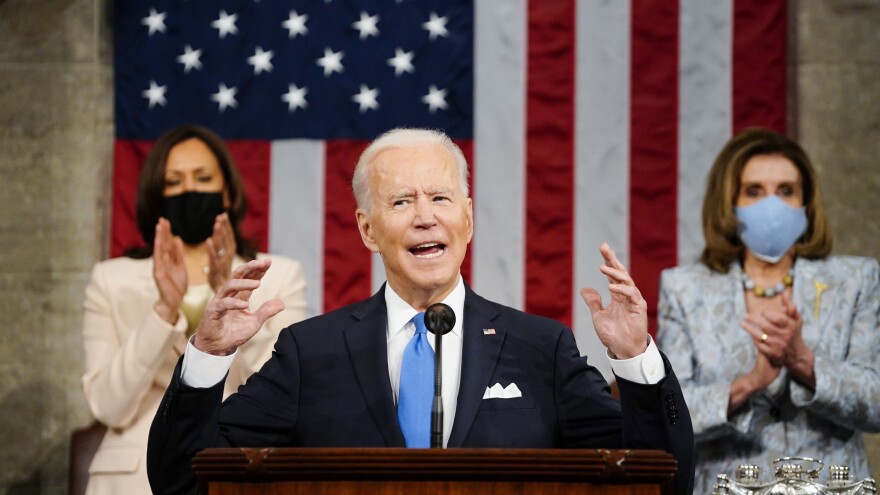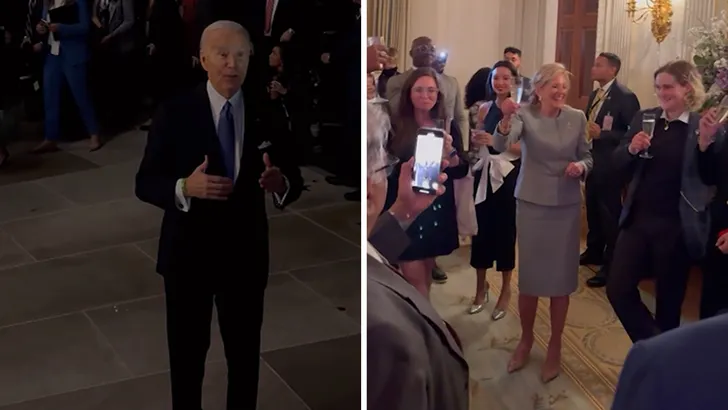President Biden’s recent engagement with Gen-Z influencers at the White House during his State of the Union address has sparked curiosity and discussions about its impact on youth engagement in politics. With over 60 influencers in attendance, including prominent figures like Tiffany Aliche, the event aimed to bridge the gap between traditional politics and the digital age.

Reaching the Youth: Biden’s Unconventional Strategy
President Biden’s decision to invite Gen-Z influencers to the White House reflects a strategic shift towards targeting younger demographics. By welcoming individuals with massive online followings, ranging from finance experts to fashionistas, Biden’s team recognized the influential role these content creators play in shaping public opinion among the youth. The presence of diverse voices, including political activists like Aaron Parnas and reality TV stars like Joey Zauzig, showcased an inclusive approach to engaging with different segments of Gen Z.
The evening at 1600 Pennsylvania Ave was not just a typical political gathering; it was a fusion of politics and pop culture, where TikTok met policy discussions. As Tiffany Aliche revealed in her insights on “TMZ Live,” the atmosphere was vibrant, with an eclectic mix of personalities contributing to the dialogue. President Biden’s acknowledgment of the influencers’ significance in his campaign underscored a departure from traditional campaign strategies, signaling a willingness to adapt to contemporary communication channels.

The Influence of Gen-Z on Political Discourse
While the immediate impact of this influencer initiative on young voters remains uncertain, its potential to raise awareness cannot be overlooked. Tiffany Aliche’s observation that the event helped in raising awareness suggests that it has at least initiated conversations among Gen-Z audiences about political engagement. However, whether this translates into tangible support for Biden’s reelection bid remains to be seen.
The absence of a stringent vetting process regarding political preferences before inviting influencers highlights the Biden administration’s focus on inclusivity and diversity of perspectives. By prioritizing respect for the White House as a historical and military compound over political affiliations, the administration aimed to foster an environment conducive to open dialogue and exchange of ideas.
Implications for Future Political Campaigns
President Biden’s engagement with Gen-Z influencers sets a precedent for future political campaigns, emphasizing the importance of digital outreach and engagement strategies. In an era dominated by social media and digital content consumption, politicians must adapt their communication methods to effectively connect with younger demographics.
The success of this influencer initiative lies not only in its ability to capture the attention of Gen Z but also in its potential to inspire other politicians to explore unconventional avenues for engaging with voters. By leveraging the reach and influence of online personalities, political campaigns can extend their reach beyond traditional media channels and resonate with audiences who are increasingly turning to digital platforms for information and entertainment.
Gen-Z influencers signifies
In conclusion, President Biden’s outreach to Gen-Z influencers signifies a dynamic shift in political engagement strategies, recognizing the power and influence of digital personalities in shaping public discourse. This unconventional approach reflects a commitment to inclusivity and innovation in political communication, bridging the gap between traditional politics and the digital age. As the influence of online platforms continues to grow, such initiatives highlight the importance of adapting to evolving communication landscapes to effectively connect with diverse audiences.
As political commentator Susan Del Percio aptly summarizes, “Influencers are the new town hall meetings.” This sentiment underscores the transformative role of social media influencers in modern politics, serving as conduits for dialogue and engagement between politicians and constituents. Moreover, the success of President Biden’s engagement with Gen-Z influencers prompts reflection on the evolving nature of political campaigning in the digital era.
Looking ahead, the impact of this influencer initiative will be closely scrutinized, with questions arising about its efficacy in mobilizing young voters and shaping electoral outcomes. However, regardless of immediate electoral gains, the significance of this outreach lies in its potential to foster a more inclusive and participatory political culture.
Questions for Reflection
- How might the engagement of Gen-Z influencers impact traditional political campaigning strategies in future elections?
- What challenges and opportunities does the integration of digital influencers pose for political communication and engagement?
- To what extent do you believe Gen-Z influencers can influence the political beliefs and behaviors of their followers?
- In what ways can politicians effectively leverage social media platforms to connect with younger demographics while maintaining authenticity and credibility?
- How might the role of influencers in politics evolve in response to changing digital landscapes and societal trends?
Twitter Quotes:
- “President Biden’s outreach to Gen-Z influencers exemplifies the modernization of political communication strategies. #GenZ #Politics”
- @PoliticalInsight
- “Engaging with digital influencers reflects a recognition of the changing dynamics of political discourse in the digital age. #Biden #Influencers”
- @SocialCommentary
Reddit Excerpts:
- “It’s interesting to see politicians embracing social media influencers as part of their communication strategy. Do you think this will become the norm in future elections?”
- u/PoliticalObserver123
- “I appreciate the effort to reach out to younger voters, but I wonder how genuine these interactions really are. #Politics #Influencers”
- u/CuriousCitizen99
